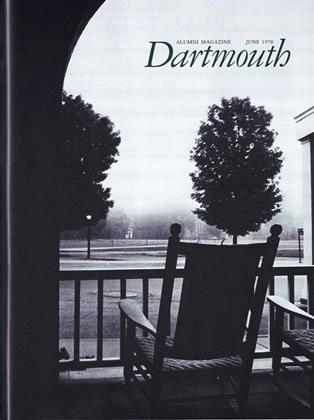At the newspaper where I work, there's a small group of us that regularly meets at lunch time to talk about whatever we think is hot, and the day after the first episode of Holocaust was telecast the discussion was begun by one young woman who believed the question of the day should be "who is this Michael Moriarty?"
Fortunately, I was able to answer that question in some detail, and the ensuing days were filled with more signs that Mike's portrayal of the ultimate Nazi organization man, Erik Dorf, had produced a quantum leap upward in Mike's career. This is not to say that he had been laboring in obscurity - in 1974 he had won both a Tony (for his performance in the Broadway play Find Your Way Home), and an Emmy (for his television performance opposite Katherine Hepburn in Tennessee Williams' TheGlass Menagerie). But all the signs are that he has now made the leap to popular stardom.
It turned out that the young woman who had asked who Mike was had watched the first episode with two other people who regarded Moriarity as almost a cult figure and perhaps the best actor at work in America today. The following day the paper's projects list came across my desk listing a story on Mike aimed at answering the question: "What's it like to have the most hated face since Hitler?" And then a feature article in the May 8 issue of People provided some of the answers to that question.
Mike told the reporter from People about a run-in he'd had with a couple of fans while minding his own business sitting in a Miami coffee shop in the days just after Holocaust had run. "There was this woman going home," Mike recalled, "and she said to her husband, 'Geroge! George! I just saw the Nazi! The blond Nazi! He was sitting right there.' Then the manager looked up at me, and she said, 'Oh, you're the one - I hate you, I hate you! God, do I hate you!'"
When I finally reached him in New York, Mike did add the qualifying note that usually, when people came after him like this, they did it "with a smile."
Mike's goal in the teleplay was not, of course, simply to make his character despicable. Somehow, he was supposed to make the monstrous evils of Nazi Germany comprehensible. "The point," Mike told People, "is that anyone could become Erik Dorf. There, but for the grace of God, go I. That role helped make me a Catholic. The only way I could sustain the rage within Dorf, without guilt, was (by seeing) the image of Christ, allforgiving and all-loving."
After Dartmouth, Mike had gone to the London Academy of Music and Dramatic Art on a Fulbright scholarship, then returned to his hometown of Detroit where, after a stint selling tires, he began his acting career with various regional theaters and off-Broadway companies, and doing a lot of waiting on tables. In 1973, he played the Tom Seaver-esque pitcher who befriends an unpopular young catcher (Robert DeNiro) who is dying of cancer in Bang TheDrum Slowly, and also appeared in Report tothe Commissioner. Since then, he has completed the filming of Dog Soldiers, which comes out this summer, and in which he portrays a war correspondent in Vietnam who becomes disillusioned with the war.
Along with his acting, Mike has also been pushing ahead in his career as a jazz pianist. He recently performed at Reno Sweeney, which is, I'm told, a small club in Greenwich Village where New York's smart set goes when they aren't taking in the latest punk-rock act at 'BGB's. He also expects to have a record out this year. His style is very much in the vein of the 1950s jazz greats, and he credits Bill Evans, Miles Davis, and Ahmad Jamal as having been major influences on him.
Not surprisingly, Mike reported on the card he sent in response to the last class newsletter that "things are going wonderfully well," and added that his major interest at the moment is a program called "Potter's Field." The program, which began last September, consists of around 60 students who take classes, put on performances, and conduct workshops on Shakespeare. Mike's hope is that it will become something like a dance troupe - a group of performers who will study and work together on a certain type of performance for a long period of time, and will in this way achieve a measure of excellence that Mike apparently feels is missing from most Shakespearean performances in America at present.
Michael Moriarty '63 recently starred asNazi official Erik Dorfin NBC's Holocaust
 View Full Issue
View Full Issue
More From This Issue
-
 Feature
FeatureShhh. There still are idealists abroad and they're called the Peace Corps
June 1978 By Dan Nelson -
 Feature
FeatureHonorary Degrees
June 1978 -
 Feature
FeatureThe Valedictories
June 1978 -
 Feature
FeatureFancies, Toyes and Dreames
June 1978 By Mark Hansen -
 Class Notes
Class Notes1974
June 1978 By STEPHEN D. SEVERSON -
 Article
ArticleBad Times to Big Time
June 1978











